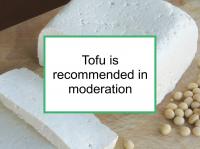Tofu (bean curd) is produced by coagulating soy milk and forming the curds into blocks. Soy milk is made by soaking dried soybeans and then grinding, boiling and straining them. Various coagulants are used, typically salts (calcium sulfate, calcium chloride, or magnesium chloride). Some of the soybean isoflavones are lost in the production of tofu.
Using calcium sulfate as the coagulant in making tofu has been found to maximize the retention of isoflavones. Tofu is a source of dietary protein, iron, choline, copper and the phytoestrogens genistein, genistin, daidzein, and daidzin. Tofu may also be high in calcium or magnesium depending on the coagulant used. Tofu's calcium content may help it prevent bone loss. The firmness of tofu depends on its moisture content. Tofu can also be fermented (pickled tofu) or flavored. Consumption of tofu has been found to be associated with lower risks of gastric, colorectal and prostate cancer.
Breast cancer-related effects of eating tofu
Our conclusion that eating tofu could be beneficial is based on the available epidemiological evidence concerning tofu consumption and breast cancer incidence. Separate webpages cover soybean paste, soybean oil, soy protein isolate and soybeans. We attempt to untangle the conflicting findings concerning soybeans and their component phytoestrogens and breast cancer in the genistein and daidzein webpage.
Population studies have found that high tofu intake is associated with lower risk of breast cancer, especially for pre-menopausal women. Childhood consumption of tofu appears to enhance the protective effect of tofu in premenopausal women. Most of the studies concerning tofu consumption and risk of breast cancer have been conducted among Asian or Asian-American women, raising the possibility that tofu consumption is a marker for other protective aspects of Asian diets or lifestyles. However, one North American study not focused on soyfoods or Asian cases found tofu consumption to be associated with lower risk of premenopausal bilateral breast cancer.
On the other hand, tofu tends to incorporate some copper (approximately 1 mg per ounce, although it can vary), which has been shown to increase angiogenesis (new blood vessel formation) and metastasis of breast cancer, especially in aggressive forms of breast cancer such as inflammatory (IBC), triple negative (ER-/PR-/HER2-), and HER2 overexpressing (HER2+) breast cancer. Although copper is a vital nutrient, women with breast cancer who are not anemic probably should not exceed the RDA (recommended dietary allowance) of approximately 0.9 mg.
Additional comments
Tofu consumption has been found to be associated with lower serum levels of dioxin-like compounds in elderly Taiwanese (who accumulated the dioxins through fish intake), suggesting a protective mechanism of action. There has also been some controversial research suggesting that long-term tofu consumption is associated with impaired cognitive function in older men.
Tofu products listing carrageenan (a potential breast carcinogen) as an ingredient should be avoided.
Sources of information in this webpage
The information above, which is updated continually as new research becomes available, has been developed based solely on the results of academic studies. Clicking on any of the underlined terms will take you to its tag or webpage, which contain more extensive information.
Below are links to 20 recent studies concerning this food and its components. For a more complete list of studies, please click on tofu.
